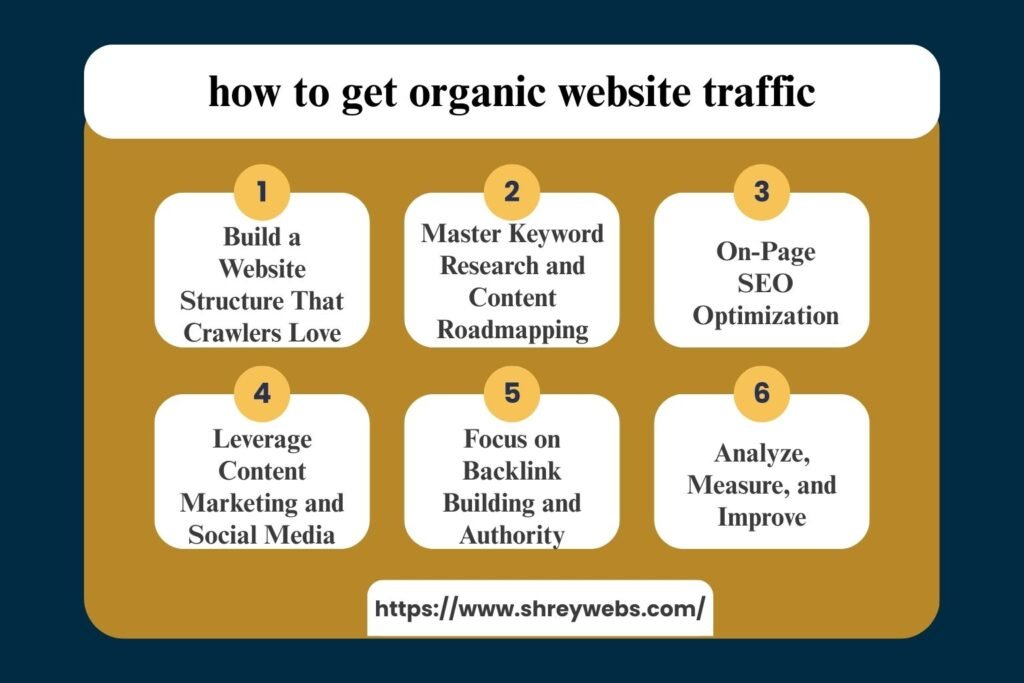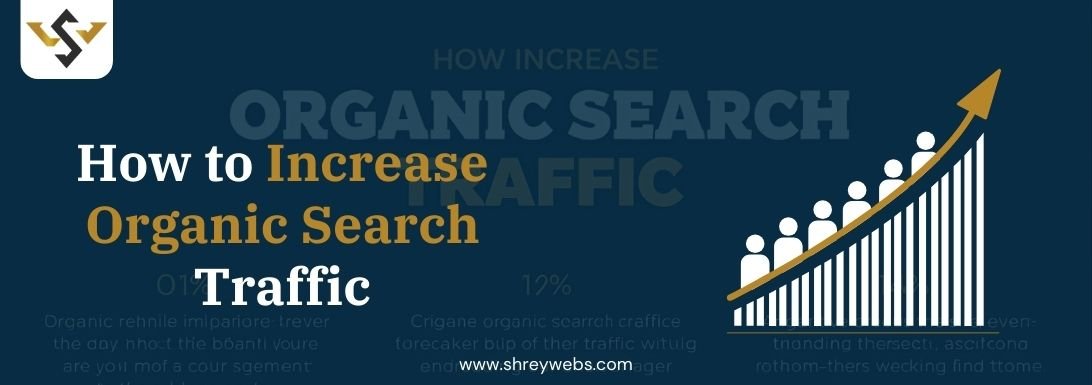To grow your website’s organic traffic today, you need more than just a fantastic product or service. You need to be visible on search engines so new people can find you. Yes, paid ads get fast clicks, but they can get costly over time. The better move is to learn how to increase organic search traffic. This means the clicks come to you because you deserve them, not because you pay for them.
This guide provides clear, step-by-step methods to boost website traffic, establish your brand, and sustain your long-term success.
What Organic Search Traffic Means
How to Increase Organic Search Traffic is one of the most common questions business owners ask when trying to grow online. Organic search traffic refers to visitors who land on your site through free search results, without paid ads. These clicks depend on how well your content is crafted, how optimized your site is, and how closely your pages meet user intent.
Want to know how to get organic website traffic? Blend solid technical SEO with clear, high-quality content and a site experience that keeps users happy. According to recent website traffic statistics, organic search still contributes more than 50% of overall website visits, making it the most reliable growth channel.

Step 1: Build a Website Structure That Crawlers Love
Before anything else, a tidy website structure lays the foundation for how to increase organic search traffic. Search engines require a clear path to discover and list your pages effectively.
- Arrange URLs in a logical hierarchy, moving smoothly from the homepage to deeper content.
- Strengthen internal linking to help both users and crawlers navigate seamlessly across your site.
- Keep your site speedy and mobile-friendly, because a slow site frustrates visitors and search engines.
For a deeper understanding, check out this guide on What is Website Indexing. Proper indexing ensures your pages get discovered quickly, helping you improve website ranking over time.
Step 2: Master Keyword Research and Content Roadmapping
Keyword research stays at the core of SEO. Instead of chasing the most searched terms, look for long-tail keywords. They attract users who know what they want.
- Check which keywords your competitors rank for.
- Use Google Keyword Planner, SEMrush, or Ahrefs for insights.
- Cluster content into topical groups to establish authority.
This approach helps you align content with audience needs and directly supports strategies to increase organic traffic.
Step 3: On-Page SEO Optimization
On-page SEO is one of the most effective answers to how to increase organic search traffic because it directly influences how search engines read and rank your site. Even small adjustments to your pages can significantly improve Google rankings and overall visibility.
- Craft enticing meta titles and descriptions that boost click-through rates.
- Structure your headings logically (H1-H4) to tell readers and crawlers the content order.
- Please ensure images have clear alt texts and file names to aid search engines in understanding them.
Additionally, structured data plays a big role in visibility. Our guide, SEO Growth with Structured Data, shows how this code helps search engines display richer snippets, giving you higher click-through rates (CTR) on the results page.
Step 4: Leverage Content Marketing and Social Media
ontent marketing wakes your target audience, while social media spreads the word. Together, the pair forms a turbocharged pipeline for free search growth.
- Create blog posts, in-depth guides, and real-world case studies.
- Distribute the polished content on every suitable social channel.
- Get your audience to comment and share. Backlinks from them help, too.
For businesses, integrating a Social Media Marketing Service into your strategy is a proven way to boost website traffic indirectly while strengthening brand trust.
Step 5: Focus on Backlink Building and Authority
One of the most effective answers to how to increase organic search traffic is by building strong backlinks. Backlinks serve as votes of trust, showing search engines that your site is credible and worth ranking. Securing links from reputable, high-authority websites enhances your domain authority and helps you improve website ranking.
Here are effective strategies:
- Write guest posts for leading industry blogs.
- Tackle digital PR and cultivate influencer partnerships.
- Design and share visually striking infographics and in-depth case studies.
Powerful backlinks do more than increase organic traffic; they also spotlight you as the go-to source in your field.
Step 6: Analyze, Measure, and Improve
SEO is the marathon of marketing. Without regular milestones, you can’t be certain your tactics are paying off.
- Use Google Analytics to watch how visitors interact with your site.
- Monitor website traffic statistics for growth patterns.
- Hone your eCommerce SEO tactics using the data from Google Search Console.
By checking your metrics regularly, you can adjust your promotional efforts and steadily increase traffic over the long haul.
Special Focus: SEO Strategies for eCommerce Websites
Online stores deal with specific SEO hurdles due to numerous product listings and fierce competition. Tailored SEO strategies for eCommerce websites can deliver measurable results.
Enhance Product Pages
- Write original, keyword-rich product descriptions.
- Use sharp, high-quality images supported with descriptive alt tags.
Implement Schema Markup
Schema gives you extra visibility by displaying product essentials, like price, star ratings, and stock status, right in search results.
Improve Site Navigation
When visitors find their way easily, they linger. Longer visits indicate to search engines that your site is of high quality, which helps improve Google rankings.
With the right seo strategies for e-commerce websites, online stores can stand out in crowded markets and consistently drive conversions.
Common Mistakes to Avoid
- Stuffing too many keywords can harm your ranking instead of improving it.
- Neglecting technical elements, like site speed, can slow you.
- Failing to track website traffic statistics to guide improvements.
- Neglecting mobile optimization, a key factor to improve website ranking.
Conclusion
Knowing how to increase organic search traffic isn’t about one-time fixes it’s a continuous process of optimization, tracking, and refining strategies. From technical improvements and content marketing to backlink building and SEO strategies for eCommerce websites, every step contributes to long-term growth.
When executed consistently, these strategies will help you increase organic traffic, boost website traffic, and steadily improve Google rankings, all while building authority and trust in your niche.

